Champions of Change Blog
Making Chicago the Most Immigrant Friendly City
Posted by on September 19, 2013 at 3:13 PM EST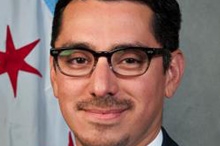
Adolfo Hernandez is being honored as a Champion of Change for working tirelessly to effectively integrate immigrants civically, linguistically, and socially into the fabric of their neighborhoods.
Growing up in Chicago’s Little Village neighborhood, a Mexican immigrant community on the city’s southwest side, I recall the number of family-owned businesses lining the streets on my walk to and from school --everything from restaurants and grocery stores to hair salons and dress shops. It never occurred to me then that this business corridor known as “la veintiseis” or 26th Street was one of the highest revenue generating business corridors in the city, often referred to by Mayor Rahm Emanuel as the city’s second Magnificent Mile.
Much like “la veintiseis”, immigrant business corridors around the city have always served as economic engines for neighborhoods and the city as a whole. Immigrants in Chicago and across the country are twice as likely as U.S. born individuals to start a small business and are more likely to hire locally. Small businesses are the backbone of our local economy. With a strong history of immigration and one in five Chicagoans being foreign born, we support immigrant integration because it is part of our values and because it creates economic value for our city.
In 2011 I was appointed by Mayor Emanuel to serve as the Director of Chicago’s Office of New Americans. The Office of New Americans was created by Mayor Emanuel to make Chicago the most immigrant friendly city in the country by better leveraging the contributions of immigrants through enhanced collaboration between city government, community organizations, academic and faith based institutions, and the private sector. Each of these sectors plays a vital role in welcoming immigrants and helping them successfully integrate.
With more than 140 countries represented and over 100 languages spoken in our city, Chicago is a global city with strong connections to the rest of the world, making it an attractive destination for immigrants. Immigrants arrive with varying professional skill levels, language abilities, and financial means, but they all arrive with the hope of achieving the American dream. The Office of New Americans has worked to help immigrants of all backgrounds integrate and become meaningful contributors to our civic, cultural and economic life.
In Chicago we have launched language accessible business expos in community settings on how to start a small business, navigate the licensing process, comply with tax laws, and interact with chambers of commerce. Through a partnership between Chicago Public Libraries, United States Citizenship and Immigrations Services (USCIS), and community based organizations we launched the Chicago New Americans Initiative offering naturalization assistance in 27 neighborhood libraries. We are conducting training with Chicago Public School counselors to provide Chicago’s DREAMers and their families with tailored support so students can excel in the classroom and obtain guidance in applying to a college or university; ensuring that our undocumented students have the information they need to achieve a higher education, access financial resources and seek a bright future.
Immigrants remain crucial drivers of our city’s economic growth and cultural vitality. While other cities may work to make themselves less welcoming toward immigrants, we choose to value their contributions, recognizing the importance of immigrants to Chicago’s future.
Adolfo Hernandez serves as the Director of Chicago’s Office of New Americans (ONA). Under his leadership the ONA has launched the New Americans Small Business Series, the Chicago New Americans Initiative.
Learn more about ImmigrationWelcome Dayton: Immigration Friendly City
Posted by on September 19, 2013 at 3:07 PM EST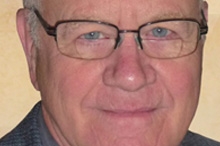
Tom Wahlrab is being honored as a Champion of Change for working tirelessly to effectively integrate immigrants civically, linguistically, and socially into the fabric of their neighborhoods.
Welcome Dayton is a community effort to establish our city as a place friendly for immigrants. In recognizing our rich history as a city and country built in part on the contributions of people arriving from every continent, we choose to recognize and appreciate the wealth of perspective and experience offered by our diverse population. After years of practice in transformative mediation with individuals in conflict, I realized the great possibility of orchestrating a similar practice on a community and policy level. As such, the process to create Welcome Dayton was informed by the principals of transformative mediation and continues to be a collaborative practice to surface the vast resources abundant in Dayton’s residents and recent immigrants.
Dayton received national attention when we enacted this immigrant friendly initiative. Welcome Dayton consists of two parts – the initial plan, and the many initiatives that continue to emerge as part of the “welcoming” vision. The initial plan was created and formalized through community conversations that explored the question, “What is possible if Dayton became a city that intentionally welcomed immigrants?” The participants self-organized and wrote, in 90 days, a plan that was unanimously endorsed by the City Commission.
This process was rooted in years of experience at the Dayton Mediation Center where it was apparent that community dialogue and local actions can create long-lasting change. Recognizing the power of community dialogue, the Dayton Human Relations Council (HRC), of which I was director at the time, initiated this bold and innovative dialogue engaging the community and enacting public policy that formed Welcome Dayton. On a local level, Welcome Dayton challenged the popular sentiment for and public policy on immigration, demonstrating our capacity to engage in a deliberative dialogue on issues of immigration.
Tom Wahlrab, chair of Dayton’s Immigrant Friendly Core Team, is the former Executive Director of the City of Dayton (Ohio) Human Relations Council and the Dayton Mediation Center.
Learn more about ImmigrationTennessee leads the way in cultivating strong communities
Posted by on September 19, 2013 at 3:01 PM EST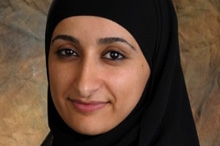
Kasar S. Abdullah is being honored as a Champion of Change for working tirelessly to effectively integrate immigrants civically, linguistically, and socially into the fabric of their neighborhoods.
Since the 1990’s, Nashville has become a new destination for many immigrants and refugees like myself. As cities and towns experience a demographic shift, some long-time residents have expressed unease and confusion, even fear, resulting in additional obstacles for new arrivals to integrate. In 2006, a group of concerned Tennesseans from different walks of life—business, faith, education, and government—came together for the purpose of intentionally building communities that are more welcoming for new arrivals. The Welcoming Tennessee Initiative is a project run by the Tennessee Immigrant & Refugee Rights Coalition (TIRRC), which is founded on the notion that immigrant integration is a two-way process: as immigrants become more engaged and active citizens, members of receiving communities expand their own sense of identity to make room for their newest neighbors.
I have addressed the unique social conflicts facing our community for many years, and my own story reflects the struggles of many New Americans to integrate. I fled my ancestral home of Kurdistan at the age of six in the wake of Saddam Hussein’s attacks, and spent my childhood in a refugee camp in Turkey. Living in the U.S. as an American Muslim leaves me little choice but to engage others in dialogue about global migration and the rising tensions of religious conflict in my new home. Every day, I am more motivated to find ways for New Americans to fully integrate into the civic life of the broader community, and for receiving community members to better understand why people leave the land of their birth and travel to places like Tennessee. I gain my strength from my faith, my two amazing little girls, a compassionate husband, and the wonderful Tennesseans who strive to know their neighbors and are eager to build strong, integrated communities.
While immigration is not new to Tennessee, each new arrival brings her own unique immigration story. Through my years of leadership and service with TIRRC, I’ve worked with receiving community members to address issues related to immigration and faith through public dialogues, over shared holiday meals from Thanksgiving to Ramadan to Seder, and sometimes by a discussion over some good iced tea. I personally believe that if the human mind continues to be unengaged and remains in a state of ignorance, ignorance has the potential to lead to fear, and fear too often leads to hate. Once hate infiltrates a society, it paralyzes the mind and heart, resulting in the escalation of unbearable social conflicts and violence, as we have witnessed in cultural and religious clashes in Tennessee from burnings of mosques to deportations of families.
Welcoming Tennessee attempts to redress some of the complex issues faced by immigrants in Tennessee, dealing directly with the tensions between US-born Americans and new Americans of every ethnicity, including, but not limited to, Kurdish, Hispanic, Laotian, Ethiopian, and Somali. I firmly believe that a vigorous democracy is defined by the participation of its entire citizenry, working collectively with diverse opinions, to affect the processes that impact our everyday lives. In order for this to happen, our communities must prioritize integration, and recognize it as the foundation of a strong community.
Having had to go through the immigration system myself, I understand the obstacles of integration, the struggles of maintaining an identity, and the imperfections of our immigration system. In addition, I understand well the deep gap between refugee resettlement and adjustment. Today, I’m proud that the successful efforts in Tennessee have led to amazing work that is being replicated all over the US. My hope is that one day the United States will take the lead on integration in our diverse global society.
Kasar S. Abdulla, Former Director of Welcoming Tennessee Initiative (a project of the Tennessee Immigrant & Refugee Rights Coalition)
Learn more about ImmigrationCreating New Spaces for Integration
Posted by on September 19, 2013 at 2:48 PM EST
Jocelyn Skolnik is being honored as a Champion of Change for working tirelessly to effectively integrate immigrants civically, linguistically, and socially into the fabric of their neighborhoods.
I was born and raised in Guatemala. I moved to Jupiter, Florida in 2003 to attend University. I was nervous about the move. I thought I’d be the only Guatemalan living in this beautiful coastal South Florida community. It wasn’t until my college advisor asked me to assist him with a research project on migration that I learned Jupiter was also home to a growing immigrant community.
Beginning in the boom of the 1990s, jobs in construction and landscaping began attracting migrants from Guatemala and Southern Mexico to Jupiter. Today, Jupiter’s Latinos make up 14% of the Town’s population. But in the early 2000s, most Jupiter residents were only aware of the immigrant community via an open-air “labor market” where groups of men frequently waited to be picked up for temporary work.
As part of the research project, I went door-to-door conducting interviews. Most respondents knew little to no English, were unfamiliar with American norms and customs, many worked in high-risk jobs and they would painfully tell stories of discrimination, wage theft, and crime. I remember one father who told me he was riding his bike on his way home from work and being followed by two local teenagers taunting him. Others told stories of working for weeks without being paid. Several respondents reported that they had been victims of crimes, but feared reporting to local authorities.
The day-labor situation created legitimate human health and safety problems. Residents began to complain about the migrant presence, generating great friction between immigrants and established residents. As a university student I participated in Town Hall meetings where I witnessed these tense exchanges, some with harsh racial undertones. While I was still a student, I began interning with Corn Maya Inc. a small non-profit that served as a precursor to El Sol. We started an ESL program and a pilot labor center. We didn’t have many resources, but I managed to borrow a van and reserve university classrooms twice a week for our classes. We quickly learned that demand for our services was high.
The pilot program, along with the advocacy of a small group of neighbors, community leaders, and university students eventually convinced town authorities to approve the opening of El Sol in 2006. As with most new ventures, the stakes were high and there were many doubts. But when El Sol opened its doors in 2006, we witnessed a rapid and orderly transition from the open-air day labor market to the safe and coordinated system of the Center. El Sol rapidly evolved into a multi-service immigrant integration center, providing vocational training, computer literacy classes, health and legal workshops, and civic education (among other services). Our success stories include workers who are now fully employed, attending university, or who own their own businesses.
An event that transpired at the Center during the holiday season provides a telling example. A worker entered and came up to me as the center was about to close. I asked what I could do for him and he looked down and reached out his hand with forty dollars and said, "When I lost my job I came to the center and I was able to improve my English and find steady work. . . . I know it is not much, but I wanted to give something back to El Sol."
This young man’s gesture captures the essence of what El Sol means to Jupiter. My hope is that other communities may learn from our experience and replicate El Sol’s model.
Jocelyn Skolnik is the Executive Director of El Sol since 2009.
Learn more about ImmigrationRefugees and Successful Resettlement
Posted by on September 19, 2013 at 2:44 PM EST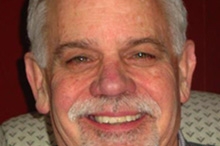
Jan Reeves is being honored as a Champion of Change for working tirelessly to effectively integrate immigrants civically, linguistically, and socially into the fabric of their neighborhoods.
Although I’ve been involved in refugee resettlement in Idaho for more than 28 years, I was already into middle age before I discovered this transforming work. Many of life’s great opportunities appear serendipitously and the key to unlocking doors, invariably, is to recognize them, understand their nature and act on them with gusto. If you’re lucky, an opportunity will arise that captures your heart and invades your bloodstream. This is what happened to me in April 1985, when I responded to a refugee related job posting in Boise.
Refugees coming to the United States have faced the most severe forms of persecution, dehumanizing violence and degradation, and they bring with them little more than memories and hope. I’ve found nothing more rewarding than seeing people who have faced unknowable adversity rise out of their shattered pasts to find a place of safety and to succeed in remaking their lives. And to have a role in fostering this transformation and to be able to witness such valiant human resilience is a gift, indeed.
Although there are many commonalties between refugees and immigrants coming by other means to the U.S., one difference stands out. There is a unique and ongoing tension between the recognized need for the United States to provide global leadership in the protection of refugees world wide—which includes resettlement as an option—and the perceived capacity of local communities to successfully resettle them. “Successful” resettlement means to assure that the opportunities and motivations are in place for refugees to fully integrate into the fabric of American life—not to give up their heritage and identity, but to bring them to the table.
From the beginning, I was fortunate to associate with many colleagues who understood that unless refugees—and, by extension, other immigrant groups—had unrestricted opportunities to fully realize their human potential, the work would be incomplete. I took from this association a passion for working toward the full integration of refugees into our communities, where they would feel a genuine sense of belonging and where they would know that their talents and abilities would be appreciated and put to good use.
In early 2009, another meaningful opportunity came my way. The Mayor of Boise, Dave Bieter, wanted to better understand how the financial crisis and resulting economic upheaval was affecting the rapidly growing refugee population in the area. He was hearing concerns voiced by constituents and community leaders and wanted to be sure the City was doing all it could to weather the storm. The resulting collaboration between the Mayor’s Office and the Idaho Office for Refugees engaged dozens of key stakeholders, interested community members and other partners to produce the City’s first Refugee Community Plan. In the summer of 2010, the plan was completed and we are now into three years of implementation. The Plan aims to strengthen supports for refugee resettlement in the greater Boise area by mapping resources, assessing service needs, and identifying areas where resources for the effective resettlement of refugees can be better utilized, coordinated or expanded. The central message that emerged from this process was that limiting the number of refugees coming into our community is not the answer; being more strategic to ensure that our capacity continues to grow is.
Being a welcoming community goes well beyond smiles and encouraging words, although these acts of kindness are essential. A true welcome is revealed by the meaningful and myriad opportunities that newcomers find to embrace community, share talents and contribute to the welfare of all.
Jan Reeves serves as Director of the Idaho Office for Refugees (IOR) based in Boise.
Learn more about ImmigrationCivic Engagement and Integration of the Whole Community
Posted by on September 19, 2013 at 2:40 PM EST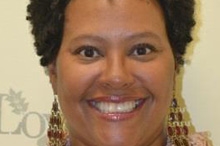
Al Heggins is being honored as a Champion of Change for working tirelessly to effectively integrate immigrants civically, linguistically, and socially into the fabric of their neighborhoods.
If each of us would take a mindful assessment, we’d discover there are many communities in which we have membership. The question I want you to consider (and one I pose to myself often) is “Am I civically engaged in the communities to which I belong?” If the answer is yes, the follow-up question is harder; “What is the proof?”
To prove whether or not I am civically engaged I answer “yes” or “no” to the following three mini questions: Did I stand? Did I speak? Was I heard? These three critical elements of civic engagement are markers for me. To stand up, speak out and be heard means that I am concerned about issues that impact me, my family and my fellow human beings.
I grew up spending time between Kannapolis, NC & China Grove, NC. Both were small mill towns, but one key difference was that China Grove had farms and Kannapolis was urban. My earliest memory of civic engagement is riding in the back seat of my mother’s 1965 black & white Plymouth Fury as she drove community members to the voting polls. I didn’t understand what was happening, but I knew intrinsically I had to help. I knocked on doors to let folks know their ride had arrived, helped the physically challenged get in & out of the car, and distributed sample voting ballots.
On many Saturdays throughout the summer & fall, my father would load fresh produce grown on our farm in China Grove into the trunk of his two-tone green, 1948 Fleetline Chevrolet. We’d ride down to Kannapolis. Once there, I’d put produce into my red Radio-Flyer wagon and pull it down Carver Street to the homes of the infirm, the elderly, and the families in financial struggle. The price for produce was whatever folks deemed fair or it was free because the week had been money lean.
I share these stories because the experiences translate into my work in a deep way; that each and every living organism on this planet has an appointed duty. Each human life has value and should be honored & treated with dignity. I know that I have a responsibility to all members of my communities. Robert K. Greenleaf coined servant-leadership, but my parents imprinted it into my essence.
In High Point, as we go about the work of fully integrating immigrants into our community, it’s not about creating a special corner. It’s about creating space for the Hindu Temple to be next to the Christian Church, the Muslim Mosque, the Sikh Temple and the Jewish Synagogue. It’s making sure students have access to academic opportunities. It’s making sure immigrants stand next to, speak with and are heard by (while also hearing) non-immigrants in every facet of High Point life. This is what I facilitate through multiple human relations programs; bringing people from culturally diverse backgrounds together…to stand, to speak, and to be heard.
Al Heggins is Human Relations Director for the City of High Point, NC. Her department is responsible for Title VI, VII, & VIII compliance and for fostering positive human relations.
Learn more about Immigration
- &lsaquo previous
- …
- 41
- 42
- 43
- 44
- 45
- 46
- 47
- 48
- 49
- …
- next &rsaquo
White House Blogs
- The White House Blog
- Middle Class Task Force
- Council of Economic Advisers
- Council on Environmental Quality
- Council on Women and Girls
- Office of Intergovernmental Affairs
- Office of Management and Budget
- Office of Public Engagement
- Office of Science & Tech Policy
- Office of Urban Affairs
- Open Government
- Faith and Neighborhood Partnerships
- Social Innovation and Civic Participation
- US Trade Representative
- Office National Drug Control Policy
categories
- AIDS Policy
- Alaska
- Blueprint for an America Built to Last
- Budget
- Civil Rights
- Defense
- Disabilities
- Economy
- Education
- Energy and Environment
- Equal Pay
- Ethics
- Faith Based
- Fiscal Responsibility
- Foreign Policy
- Grab Bag
- Health Care
- Homeland Security
- Immigration
- Innovation Fellows
- Inside the White House
- Middle Class Security
- Open Government
- Poverty
- Rural
- Seniors and Social Security
- Service
- Social Innovation
- State of the Union
- Taxes
- Technology
- Urban Policy
- Veterans
- Violence Prevention
- White House Internships
- Women
- Working Families
- Additional Issues

